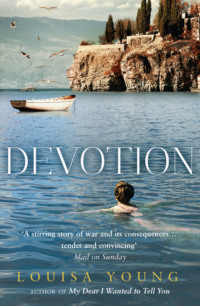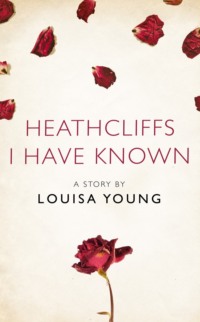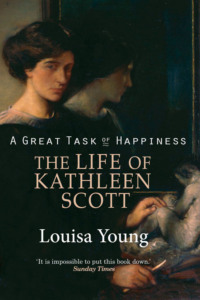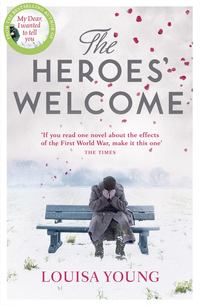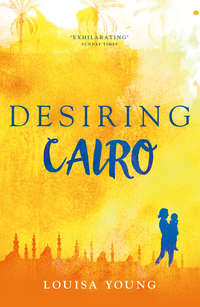
Полная версия
My Dear I Wanted to Tell You

LOUISA YOUNG
My DearI Wanted to Tell You

Dedication
For Robert Lockhart
Contents
Title Page
Dedication
Prologue
Chapter One
Chapter Two
Chapter Three
Chapter Four
Chapter Five
Chapter Six
Chapter Seven
Chapter Eight
Chapter Nine
Chapter Ten
Chapter Eleven
Chapter Twelve
Chapter Thirteen
Chapter Fourteen
Chapter Fifteen
Chapter Sixteen
Chapter Seventeen
Chapter Eighteen
Chapter Nineteen
Chapter Twenty
Chapter Twenty-One
Chapter Twenty-Two
Chapter Twenty-Three
Chapter Twenty-Four
Chapter Twenty-Five
Chapter Twenty-Six
Chapter Twenty-Seven
Chapter Twenty-Eight
Chapter Twenty-Nine
Chapter Thirty
Historical Note
Acknowledgements
About the Author
Also by Louisa Young
Copyright
About the Publisher
Prologue
France, 7 June 1917, 3.10 a.m.
It had been a warm night. Summery. Quiet, as such nights go.
The shattering roar of the explosions was so very sudden, cracking though the physicality of air and earth, that every battered skull, and every baffled brain within those skulls, was shaken by it, and every surviving thought was shaken out. It shuddered eardrums and set livers quivering; it ran under skin, set up counter-waves of blood in veins and arteries, pierced rocking into the tiny canals of the sponge of the bone marrow. It clenched hearts, broke teeth, and reverberated in synapses and the spaces between cells. The men became a part of the noise, drowned in it, dismembered by it, saturated. They were of it. It was of them.
They were all used to that.
In London, Nadine Waveney, startled from dull pre-dawn somnolence at the night desk, heard the distance-shrouded crumps and thought, for a stark, confused moment, Is it here? Zeppelins? She looked up, her face the same low pale colour as the flame of the oil lamp beside her.
Jean scampered in from next door. ‘Did you hear that?’ she hissed.
‘I did,’ said Nadine, eyes wide.
‘France!’ hissed Jean. ‘A big ’un!’ And she slid away from the doorway again.
Nadine thought, Sweet Jesus, let Riley not be in that.
In Kent, Julia Locke sat bolt upright in her bed before she was even half awake, saw the cupboard door hanging open and thought, foolishly: Oh . . . thunder . . . but she was sound asleep again when Rose, in her dressing-gown, looked in on her.
In the Channel, the waters wandered suddenly this way and that, in denial of the natural movements of tide and wind.
At Calais, a handful of late-carousing sailors paused and turned.
At Étaples, a sentry woke with a sharp nod that he felt certain would crack his head backwards off his neck. ‘Crikey,’ someone murmured, ‘hope that’s us, not them.’ Two ruins away, a sixteen-year-old whore paused and shrank, her heart battering and shaking. Her thirty-five-year-old punter fell away from her, unmanned as his blood hurtled elsewhere in his body.
Beyond Paris, a displaced peasant sleeping on a sack didn’t bother to wake. Sheep, less well-informed, panicked and ran to and fro. Their shepherds couldn’t be bothered to.
An upright piano stood in a field, gaping and rotting, where it had been since October 1914.
In the Reserve Line those who slept leapt awake; those who sat by dampened braziers jumped; those who leapt and jumped were pulled down by their comrades, with profanities and muffled cries of ‘Fuck sake, man.’ The Aussie sappers who had dug the tunnels under the German line, and laid the six hundred thousand pounds of mines, grinned and smoked. Ungentlemanly it might be, as warfare goes, but they had started that, with their filthy illegal gas – and, anyway, it’s effective. Which is all anyone cares about by now.
Up the line, the Allied men in their trenches reeled with the earth around them, and kept reeling until the earth around them let them stop. Above, a flock of starlings launched and circled, a counter-nebula of black on blue. Below, the fat rats scattered.
Across no man’s land, the soldiers flew up in the air, and fell, and the earth flew up in the air, and fell, and buried them whether they were dead or not.
And the German artillery responded, and it all doubled, redoubled, an exponential vastness, and in Berlin wives and girlfriends sat up at night desks and in beds.
Locke and Purefoy had been ready for it. That edge was on the night, the edge that leaked something coming . . . something else, beyond the ordinary filth. Everyone wore a dulled alertness, so when they started, though it was a shock, well, it was always a shock.
Locke was by the sack-flap entrance to the dugout, smoking, humming softly a song he was composing, about bats.
Purefoy was staring out through a periscope from the fire-step, thinking about Ainsworth, Couch, Ferdinand and Dowland, and Dowland’s brother, and Bloom, Atkins, Burdock, Taylor, Wester . . . and the rest. He was reciting their names, all the names he could remember, and their qualities, and trying to remember their faces, and their voices, their Christian names, and their little ways, and how they had died, and when, and where.
As the string of mines went monumentally up across the way, little landslides of earth trickled down from the ratty timber-and-sandbag ceiling on to their tea-chest desk. Locke grabbed his head, elbows round his ears. He barked, loudly, wordlessly – then flung his arms out, and strode into the body of the trench. Purefoy was already moving along the line, joking, clapping the men on their shoulders.
In the answering barrage of shells, one took the edge off the parados twenty feet along. Purefoy and Locke and their companions flung themselves down in the homely mud of their trench, that six-feet-deep poisoned haven with which they were so familiar and, crouched under the parapet, shared the peculiar safety of knowing that the worst was already happening.
Chapter One
London, towards Christmas, 1907
On a beautiful day of perfect white snow, cut-blue sky and hysterical childhood excitement, Nadine Waveney’s cousin Noel threw a snowball in Kensington Gardens. It hit a smaller boy they didn’t know, smack on the side of the face, causing him to gasp and shout and lose his footing, and knocking him on to the uncertain icy surface of the Round Pond. Still shouting, the boy, whose name was Riley Purefoy, crashed through the filmy frozen layers – and shot out again, gasping, shaking slush and icy water off himself until his hair stood on end, and laughing uproariously. Noel, who was bigger, stared at him, unsure. Nadine, standing back, smiled. She liked that the smaller boy was laughing. She’d seen him before in the park. He was always scrambling about, climbing things, collecting things. Once they’d come face to face halfway up a conker tree, deep in the green leaves. He’d had a pigeon feather in his hair, like an Indian warrior. He’d laughed then as well.
Jacqueline Waveney, well dressed, high-cheekboned, self-consciously verging on Bohemian, insisted on bringing Riley home to warm and dry him. They lived close: just across the Bayswater Road from the park gate. ‘Everyone comes here when they fall in,’ she told him, as they scurried along the path to the gate. ‘Or if they get rained on. We’re the first stop for people in trouble in the park.’ Her smile was warm and her accent strange – French, though Riley didn’t know that then.
The house was huge to him, though quite small to them. He was taken through a hall to the drawing room: ‘droing room’, Jacqueline said. Riley looked at the tall ceiling, the creamy panelling, the velvet sofas, the warm fire, the glossy peacock-green tiling around it. Inside, Mrs Waveney had him wrapped in a towel, and his clothing taken away to be hung on the boiler. He was given hot chocolate to drink, and some dry clothes to wear, too big for him. The people stood around him, noticing, but not seeming to mind, that he was really quite a common little boy.
Noel was jolly sorry, and said so gallantly.
Mrs Waveney thought: Look at him, poor thing. We could probably spare those clothes.
Her husband Robert, the well-known orchestral conductor, looked in. ‘Hello there,’ he said, or something like that. ‘What’s all this, then?’ Riley knew who he was. He’d seen him crossing the park often enough to the Albert Hall. He’d seen his picture in the Illustrated News.
Nadine, whose honey-yellow eyes slanted like a naughty fairy’s, glanced and smiled.
Riley took in the well-known dad, the friendly family, the cuddly maid, the paintings on the wall, the grand piano, the books on the shelves, the smiling girl. It was not like his house – though his house was very snug, and contained his parents and his little sisters, whom he loved and ignored, except his dad, who had given him a clockwork grasshopper for Christmas, and could still throw him up in the air. He was a fireman, and he said, ‘Don’t look to the fire brigade, Riley, it’s a good job but you can do better.’
Riley was neither shy nor ashamed to be there. He did not feel that he was in the wrong place. He tasted the hot sweet chocolate, and he looked around boldly, and he knew that this was what his dad was talking about. Better.
His clothes did not dry, and Jacqueline, who thought him sweet, with his bright eyes and curly hair, suggested he come the next day for them. His mother Bethan, a devoted woman of Welsh extraction and firm ideas, baked a batch of tarts that he was to offer as a thank-you, and remember to bring the tin back.
‘Don’t know why,’ said his dad, John, in his undershirt in the kitchen chair, braces slung over his wide shoulders, looking at the paper. ‘It was their boy knocked Riley into the pond.’
‘It shows manners,’ said Bethan. ‘Go to the back door, won’t you, Riley love? And watch out for ’em!’ she called. The middle classes were always after something from the working man. As if they didn’t have enough. Not that I’d want it. Fancy ways. Bethan had been known to laugh out loud in the street at extremes of fashion among the better classes. She watched keenly, fearfully, as her only boy went down the street to visit the other world. He won’t fall for it, will he? He won’t get ideas and resentments? We don’t want it – he won’t. We’ve brought him up right . . . She found herself murmuring a blessing for him as he disappeared round the corner.
John rolled his eyes. Bethan was stuck and strung up about the middle classes. Scared of them, wanting what they had, pretending she didn’t, resenting them for having it, and on top of all that, there was her furious head-tossing pride in being a working woman with no need for any of that, thank you very much.
*
Riley didn’t think there was a back door, unless he went down the side alley. He went to the front door. He arrived at the same time as another visitor, an older man with a beard and an alluring turpentine smell, in a black velvet coat smoothed and shining with age. For a moment Riley held back, thinking of his mother, wondering, but the man said: “Hello there, young fella!’ and they went in together.
Riley, having been led to believe that posh people were standoffish, was surprised.
‘Hello, Riley!’ called Mrs Waveney. ‘Are those for us? Mmm – how lovely of you. Noel, darling, Riley is here! Rings for Barnes, would you, and ask for some tea?’
Riley soon worked it out. It is because they are not just posh, they are artists. On Sunday strolls in Kensington Gardens Bethan took pleasure in pointing out to him different types of posh, and how ridiculous they were. Johnno the Thief would do a similar thing, judging whose pocket was worth picking at Paddington station. Riley surveyed the old man’s velvet coat, the beautiful woman’s dark red curls, the taking a common-as-muck boy back to their very comfortable beautiful house, with the paintings and the strange items . . . a curved and shining dagger hanging on the wall, tiny ivory elephants in a glass-fronted cabinet. Artistic, definitely. Bethan would sneer, because her dad hadn’t let her sing when she was a girl, and Johnno would let them pass, because ones like that never had much cash on them.
‘Top bruise!’ Noel said enviously, and poked Riley’s cheekbone. The silent girl smiled at him again, and Riley smiled back. They were in the middle of decorating a fir tree with ribbons and shining orange fruit and glass balls. Riley had seen such things in the extraordinary windows of Selfridges, the new palace of splendours from which he had been chased two days before. This one was not so big but its colours sparked his eye.
‘Come and help us,’ said Mrs Waveney. ‘Can your little fingers tie these on?’ She passed him a clear round glass ball, light as sunlight, pure as a bubble.
‘Where should I put it?’ he asked.
‘Wherever you want, darling,’ she said.
He stared at the tree. Glass balls dangled on the sprigs of dark fir, hanging, gleaming. Pink like a rose petal in the sunken garden near the Orangery, pale green like the lime-walk leaves in spring, blue like the flash under a mallard’s wing on the Round Pond. There were too many bunched up at the top. He checked how many were still in the box. Plenty to cover the whole tree. Carefully, he fed the gold wire fixing of the clear ball round a sprig on a branch in the middle, quite deep in. It would reflect the light and balance the coloured baubles. Without thinking, he undid a couple of the coloured ones and redistributed them lower down.
The older man watched Riley, smiling, enjoying the care he took, noting his flat, broad-cheeked face, his scruffy curly hair, his dark eyes, his wounded look.
They drank tea, ate the jam tarts. Jacqueline was amused by the way Riley tucked in. Many boys would feel obliged to hold back, under the circumstances.
When the time came for Riley to leave, Robert Waveney said courteously, ‘Well, now, Riley, Sir Alfred likes your face. He wants to put it in a painting, on top of a goaty-legged faun. What do you think? Could you sit still long enough for him to paint you? He’d probably give you a shilling.’
Riley saw the gates of opportunity swinging open before his eyes. Beyond, he could see Better, shining in the distance like the lilies of heaven. ‘Course I can, Mr Waveney,’ he said.
Chapter Two
London, 1907–14
Riley, the Waveneys and Sir Alfred lived in a part of London that, from one street to another, couldn’t make up its mind. Riley’s home was a little house up by the canal, a working man’s cottage, in a row, damp, with a yard with a privy in it. Two minutes away was Paddington station, through which the whole empire passed, observed for pick-pocketing purposes by Johnno and by Riley out of pure human curiosity. (Riley did not pick pockets. He’d promised his mum.) Five minutes from there was Kensington Gardens, where the trees were tall and the grass was smooth and children in white petticoats dashed after hoops, and nannies in uniform dashed after them. If Riley went with Johnno, the park-keeper chased them out. If he went alone, and was clever about it, he could play there all day, watching ducks, climbing trees, diving and dipping in the Serpentine, spying on gardeners, learning statues by heart, hiding.
Beautiful houses lay along the north side of the park: Georgian villas with magnolias in their wide gardens; high white stucco-fronted mansions, mad fairy-tale apartment buildings six storeys high, with curved balconies and conservatories, and ornate bay windows at unlikely angles. The Waveneys’ was the first Riley had been into. Sir Alfred’s, in Orme Square, was the second. At the Waveneys’ he had fallen for the comfort; at Sir Alfred’s, it was first Messalina, the great dane, big enough to pull a cart, with her ebony satin jowls and quivering legs, and second the paint: the colours, and the smell, and the rich oily shining magnificence. And then the paintings: heroines and beggar maids, knights in gleaming silver-grey armour, coiling strings of flowers and loops of braided hair, emerald weeds floating under water, gauzy drapes of cloth you could see through to the wax-white glowing flesh beneath, glimpses of cavernous blue skies . . . all made of paint, and light seeming to come from inside the canvas. It looked like the real world, so real, but much, much better. It was a kind of miracle to Riley that such things could be created out of thick coloured oils squeezed from lead tubes.
And there was Mrs Briggs, purse-lipped and holy-minded, who gave him cake and hot tea.
Riley knew perfectly well that this was not his world. He recognised that if he did not act swiftly it might be whisked away from him as quickly as he had been whisked into it. If someone were to look closely at the expression on the face of the young faun garlanded with vine leaves standing to the left of Bacchus in Sir Alfred’s famous painting Maenads at the Bacchanale, they might detect in it a badly concealed combination of desperate desire, cheerful delight and devious determination.
‘What are you painting next, sir?’ he asked, with bright, transparent disingenuousness.
‘The Childhood of the Knights of the Round Table,’ Sir Alfred said, amused.
‘Any of ’em look like me at all, sir?’ Riley said, putting on a noble expression, and turning a little towards the light.
He almost wept with joy when Sir Alfred agreed that his face was just right for the young Sir Gawaine fighting his way through a thorn bush (representing the Green Knight he was to face in years to come), which would require another few weeks of his presence.
Riley applied his mind to ways of making himself useful to Sir Alfred, his various pupils, and to Mrs Briggs. There were plenty: errands, tidying up, fetching, copying, sharpening, lining up, climbing to the upper shelves, which neither Sir Alfred nor Mrs Briggs could reach. Every day, modelling or not, he turned up after school ‘in case Sir Alfred needs anything, Mrs Briggs’ – and he always did: someone to run to the art suppliers, someone to take Messalina to run and play and leap about in the park, someone to clean up the studio without actually moving anything the way Mrs Briggs always did, someone to sit for an anonymous young shoulder or a foot, someone who didn’t mind being bossed, who loved being told things by an old man with many, many stories to tell, who was young and strong and delighted to learn how to prepare a canvas and had none of the vanities of an art student. After some months of this, Mrs Briggs, who liked everything in its place, pointed out that the position was unregulated, and the boy should be paid for his work. After a burglar stole Sir Alfred’s late mother’s jewellery, it was decided the boy should live in, as extra security. (Riley was aware of the irony.)
Bethan and John were invited to tea in the kitchen by Mrs Briggs because, after all, it was not as if they were hiring a servant. Riley, only half aware that this was improper, dragged them upstairs to meet Sir Alfred, and to see his studio, and his paintings. John thought the paintings beautiful, and Sir Alfred very gentlemanly, and said cautiously: ‘As long as he’s going to school . . .’
Sir Alfred said: ‘Of course, Mr Purefoy. He’s an intelligent lad.’
Bethan said very little, and that night she cried because she knew she was outnumbered.
From the beginning, Riley wrote down every word he heard that was unfamiliar to him. On Sundays, when he took his wages home, he would ask his parents what these new words meant. If they didn’t know, he would ask Miss Crage at school. If she didn’t know, he would go through the tall, feather-leaved volumes of Sir Alfred’s Encyclopedia Britannica. Or ask Mrs Briggs. Or Nadine, who came every Saturday morning for her drawing lesson. Or he would ask Nadine’s mum and dad, when she invited him back there – like that day when she dragged him to see the new statue of Peter Pan, which had appeared overnight in the shrubbery by the Serpentine, gleaming bronze among the heavy leaves, and afterwards they went to her house, and Sir James Barrie himself was there, drinking tea and laughing about the big secret and surprise of the statue, laughing such a wicked little laugh, and Riley had imitated it so well, and Sir James had said he wished he’d known Riley before because he would have modelled a Lost Boy on him, and Riley felt a momentary pang of unfaithfulness to Sir Alfred and Art, in favour of Sir James and Literature.
But, best of all, he could ask Sir Alfred.
‘Come on, you little sponge,’ he would say. ‘I only wanted a boy to clean my brushes, and now I’ve got a miniature Roger Fry on my hands.’
‘What’s a Roger Fry, sir?’ said Riley.
‘Pour me a whisky and I’ll tell you.’
*
‘Well, he’s bettering himself, isn’t he?’ said Mrs Briggs to Mrs Purefoy, when she called at the house one day to take him to buy a shirt, he was growing so fast. Mrs Briggs had bought him a shirt only two months before, but she didn’t want to make anything of it.
Bethan was glad he wasn’t running around with those boys at the station any more, but she wasn’t happy. It wasn’t just that the son of a free working man was – sort of – in service, because he wasn’t in service, quite. If he was in service, how come he was going to school each day, and how come he and the girl Miss Waveney were down Portobello together that time with that giant black dog as if it was theirs, gawking at the Snake Lady and sharing a bag of humbugs? And it wasn’t that he was getting educated beyond his station, because she knew that education meant a lot to John, though, herself, she didn’t see the point as he wasn’t so much learning a trade, was he? It wasn’t even that she didn’t see enough of him – who would expect to see a big working schoolboy of fourteen, except to feed him and make him wash if you were lucky? Many women didn’t see their working boy from one year’s end to the next. What bothered her was that he didn’t talk the same. He tried to hide it from her, when he came home, but she knew. He was learning to talk proper. They might not have done it on purpose but they had transformed him, from a blob of a boy into – well, it wasn’t clear what.
*
Robert Waveney and Sir Alfred were about to go to the Queen’s Hall to hear the marvellous Russian, Rachmaninoff, playing his new piano concerto, under Mengelberg. Riley, it turned out, was coming too.
‘He’ll appreciate it more than I will,’ Sir Alfred said truthfully. ‘In fact – actually, Robert, what do you think of this – his school chucks them all out at the end of the year – what shall we do with him? I was thinking more school.’
‘He wouldn’t get into Eton, surely,’ Waveney said. ‘He’s hardly educated at all, is he?’
‘Well, now, selfishly, I don’t want to send him away. And one doesn’t want to encourage any . . . illusions . . . or any sense of injustice. About money and so on. Resentments. I thought perhaps Marylebone Grammar . . .’
Waveney agreed that that would be more appropriate, and knew one of the governors. Riley, whose dad had told him, ‘You’re lucky if you even get one opportunity in your entire life, and when you do, I advise you to recognise it and grab it by the bollocks, and don’t let go,’ swelled with joy. A school where everybody wanted to be there was a revelation to him; the teachers spread panoplies of glorious knowledge before him, and when the other lads mocked him for this or that he hit them. All was as it should be, and he strode the territory fearlessly.



